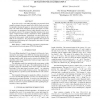Free Online Productivity Tools
i2Speak
i2Symbol
i2OCR
iTex2Img
iWeb2Print
iWeb2Shot
i2Type
iPdf2Split
iPdf2Merge
i2Bopomofo
i2Arabic
i2Style
i2Image
i2PDF
iLatex2Rtf
Sci2ools
120
click to vote
ICASSP
2011
IEEE
2011
IEEE
Proportionate-type normalized least mean square algorithm with gain allocation motivated by minimization of mean-square-weight d
In previous work, a water-filling algorithm was proposed which sought to minimize the mean square error (MSE) at any given time by optimally choosing the gains (i.e. step-sizes) each time instance. This work relied on the assumption that the input signal was white. In this paper, an algorithm is derived which operates when the input signal is colored. The proposed algorithm minimizes the mean square weight deviation which is important in many applications such as system identification. Additionally, it is shown that by minimizing the mean square weight deviation, an upper bound on the MSE is also minimized. The proposed algorithm offers improved misalignment and learning curve convergence rates relative to other standard algorithms.
| Added | 20 Aug 2011 |
| Updated | 20 Aug 2011 |
| Type | Journal |
| Year | 2011 |
| Where | ICASSP |
| Authors | Kevin T. Wagner, Milos Doroslovacki |
Comments (0)

